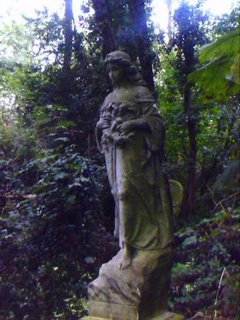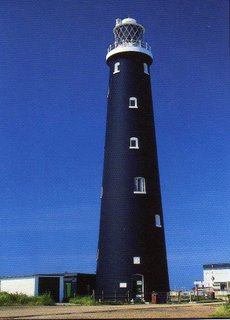This morning I've been re-listening to that little ray of sunshine himself, Bonnie 'Prince' Billy. He's such a cheery lyricist. Songs such as
Another Day Full Of Dread,
Today I Was An Evil One and of course
I See A Darkness make up this sunny and light album. One of my absolute favourites on it, however, is
Death To Everyone:
I am here/right here/where god puts none asunder/and you/in black dress and black shoe/you do/invite me underOne of the hardest things about grief, I think, is the insidiousness of it, the way it filters into every atom, every fissure of your life. How it creeps up on you when you least expect it. Making a cup of tea, the radio on, one minute you're singing along, the next you're on the floor doubled over. What happened? Perhap it was a line of a song, perhaps, just a word. Maybe it was the way your spoon clinked in your cup as you stirred in the sugar. Maybe it was noticing that picture that wasn't hanging straight on your wall and adjusting it, suddenly you find yourself staring at it, lost in its image.
It is a hard process to understand in oneself, because it is sometimes so unpredictable and apparently illogical. For me, there can be several weeks where it follows me everywhere I go, it's that black dog I simply can't shake off. Then eventually I emerge, new again, still alive, still whole, still able to smile, perhaps smiling even more. Other times I can go in and out of it on a daily, even hourly basis, one minute writing out some plan for my life, preparing an application form, the next, I am inconsolable, unable to lift a pen.
It is perhaps even harder to understand in another person sometimes. And the thing about grieving is that the only thing you can do really is carry on, is to get on with life, because you need the straight and narrow to keep to whilst your world falls apart, it's the concrete and the road signs that keep your nerve steady and your feet moving when there's a tornado tearing through all the land around you which you once called your home.
You keep looking ahead, eyes on the next step forward. And when you come across a patch of meadow that hasn't been hit you say "hey, look at those daisies, look at those buttercups, aren't they beautiful!". And they are, and you do really see it, you really can smell the grass and the earth beneath it. Sometimes it can feel like the first time you've seen a flower at all, it is
that beautiful. In that moment there is joy, so much joy to realise the grass is still growing and the flowers are still blooming somewhere, and that they all look so perfect and smell so good, even if you know that's your house over there in the distance, and it's burning to the ground.
However, the thing about getting on with life when you are grieving is that people can then believe you're ok. Of course, they want to believe that, we all do, because grief is unpleasant for everybody, even if it's not your own loss, it still brings a chill to the heart of an otherwise sunny day, it still reminds you of your own mortality, it is the cold clammy truth none of us particularly want to know about on a consistent basis. Unless it's thrust on us, of course. But when you are grieving, it is all you know. It is all you think about. It paints every aspect of your world with it's own particular colour. Life, death, ageing, sickness, beginning, ending, birth, loss, love, suffering.. questions, questions, always questions that you can never stop asking and yet must learn to live with the unsatisfactoriness of the fact that no answer can really provide you with the solace you long for.
So when you cannot yourself run away from the truth of loss, when it is right in your face, you also realise that others
can run away, that they have an option which you do not. And so, on some level they cannot access with such intensity what you youself can at this time, and that, right now, every day, they are creating and building worlds just as yours are constantly being torn down. You realise that on some level, at the end of the day, at a time when you most acutely want and need kinship and understanding as if it were air, you will be, at times, most profoundly alone.
This has been a strong realisation for me, and it's helped me grow up a lot. It's also been hard. And people are there when they can be, and some people close that gap as much as any caring person can, and it's a beautiful thing when they do. And somehow, in the times when people can't, you learn to find a way to live with that gap of experience, and not blame, and not blame yourself.
However, last year I had to let go of several people I thought were and would always be the closest people in my life because for whatever their reasons, they didn't have it in them to meet me even a tiny bit of the way in trying to understand what it must be like to be losing a parent. And that hurt. There hopefully aren't that many times in one's life when one has to hold up one's hands and call on friends and loved ones to rally round a bit -and it's hard not to feel let down when that does not happen, and people even turn away from you. I'm still working on that one.
Grief does its work on so many levels, it leaves nothing unturned, on the one hand it draws out and burns up what is not true, what is bullshit, what is fantasy, what is not good for us, what needs to go. It shows up what is weak, superficial or selfish and it highlights what is strong, what is deep, what is loving. On the other, it brings forth a demon of rage and bitterness and an unforgiving pain that will not be pacified, that does not want to understand the complexity of human foibles, only it's own need for solace. For me, I struggle to work out which is which, and what I can realistically expect from people, and that struggle is part of the complexity of my grief.
We all go to places no one else can go at times in our lives, over and over again. There are things about every single person on this planet that no one else will ever know or understand. We stand alone. And yet we cannot survive without human love. These two will hold hands in a clasp of contradiction forever.
And I wouldn't give up those moments when I realise I'm really ok being alone in darker places, I'm really ok that no one else knows all that I am keeping inside. What would the world be without its secrets? And somewhere, out there, there is always someone who has shared your experience. Because whether we realise it or not, ultimately we're all in the same shoes, heading in the same direction, coming from the same homeland. And it's a place of fire and flowers, meadows, whirlwinds, the scorched thatch and the long, long road.
I'm slowly learning to draw a circle around me, I guess you could call it a sacred circle, one that honours and cherishes that space where no one else but I can go, that lights a candle and sings softly in devotion to those darkest, loneliest hours. And to remember that there is still love over the other side of the line, sometimes imperfect, messy love, but love nonetheless. And I am not perfect, and I cannot always do the best thing, and I get upset, and I get bitter, and sometimes I flail and I rail, stumble about, and I can't always forgive others' shortcomings, and I can't always understand or even be reasonable, because I've been losing the most precious person in my life for some time now, and death isn't doing it's work kindly, and loss is a peculiar, devastating thing, and when any person deeply touches it, it is a fire in the hearth from which they cannot remove their hand, until gradually, eventually, with the passing of time, its flames die out.
So strap me on/and raise me high/cause buddy I'm not/afraid to die/cause life/is long/and it's tremendous/and we're glad/that you're here with us/
death to me/and death to you/tell me what else can we/do die do/death to all/and death to each/our own god-bottle/s'within reach..







